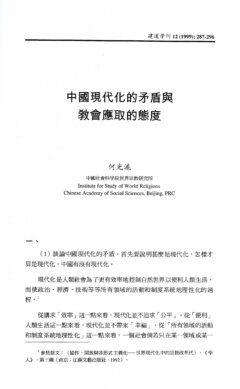中國現代化的矛盾與教會應取的態度 / 何光滬
撮要
作者指出中國的現代化尚未完成,而已經局部實現的現代化又出現一些負面影響,本文乃嘗試探討基督教在推行中國現代化過程中可擔任的角色。他指出雖在十九世紀末及二十世紀初期,中國知識分子推動的現代化運動常將基督教摒諸門外,但作者相信基督教可為中國現今現代化過程中出現的三個矛盾(經濟改革與政治改革、社會體制與國民質素、現代化要求與現代化弊端)作出貢獻。但基督教首先必須調整自身,以基督「愛鄰人」的精神進行自身的改革,協調上下,和睦左右,為中國社會樹立一個寬容、開放、向上的榜樣。
ABSTRACT
The paper argues that Christianity does have a mark in making a contribution to the Chinese modernization process. Unfortunately, during the late 19th century and the early 20th century, Christianity has been seen as an obstacle or imperialistic enemy to modernization by Chinese intellectuals.
In the present stage of Chinese modernization, there are three dilemmas: (1) the dilemma between economic reform and political reform; (2) the dilemma between the priority of social system reform and the efforts on improving individual quality of the people; and (3) the dilemma of the need and the adverse effects of modernization. The writer claims that Christian virtues (such as “love,” “humility”), its spirituality and its moral teachings would help China to deal with these dilemmas. In short, Christianity does have its positive role in the contemporary Chinese modernization process.
原載於《建道學刊》12期(1999年7月),頁287-296。







